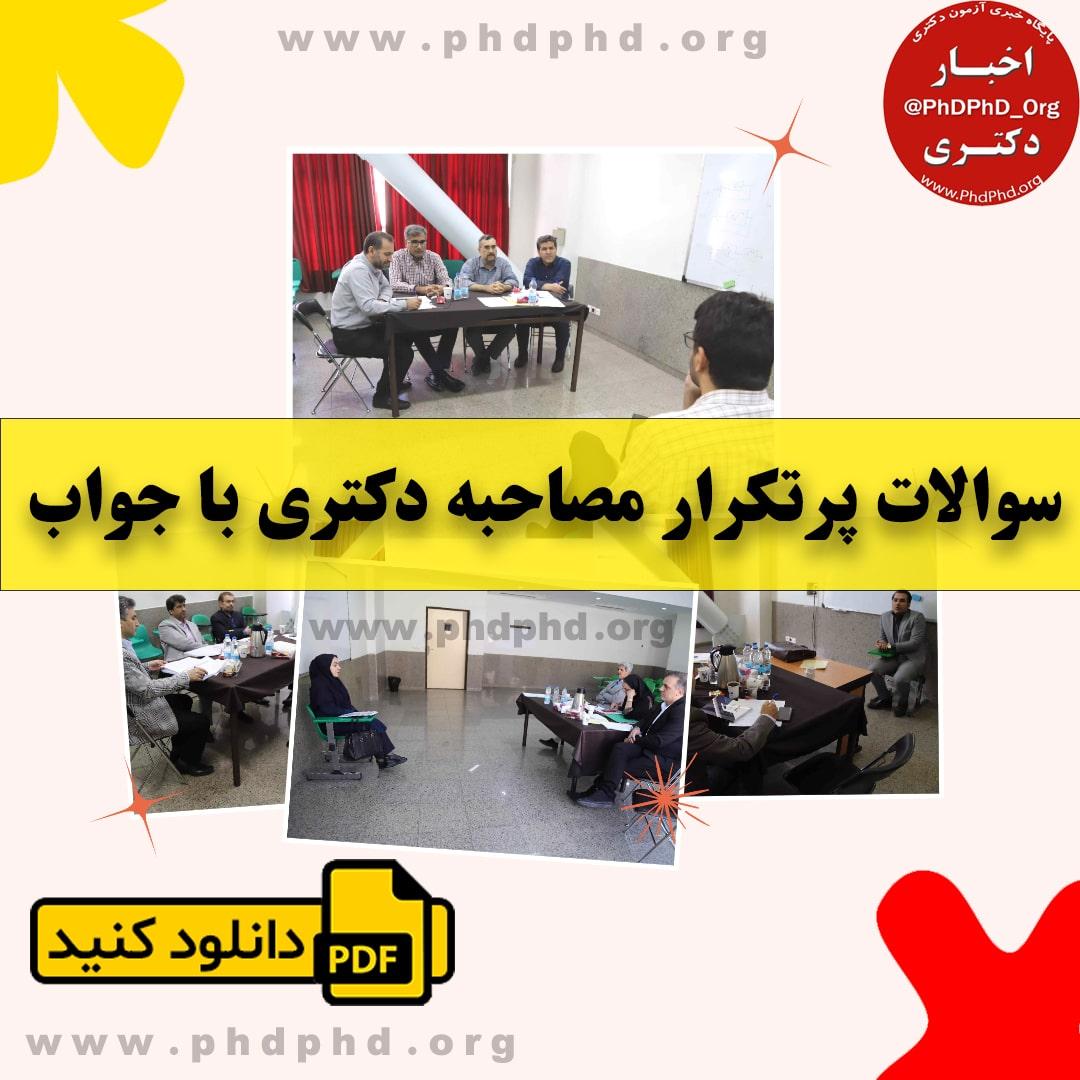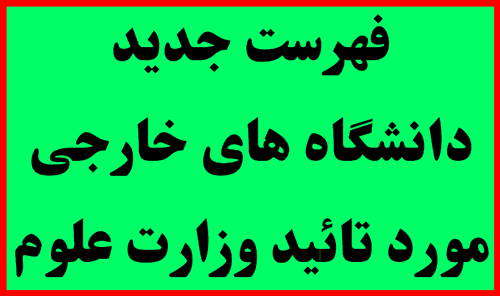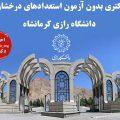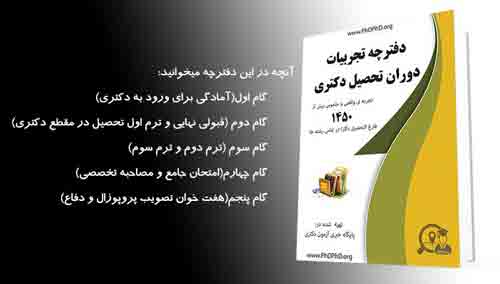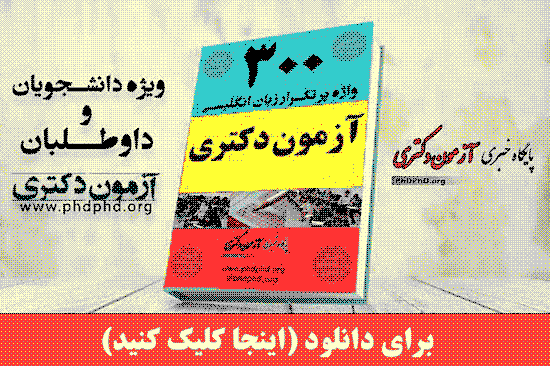- فراخوان پذیرش دکتری بدون آزمون استعدادهای درخشان دانشگاه شیراز 1403
- آمار داوطلبان انتخاب رشته کننده 67 هزار نفر
- پذیرش دانشجوی دکتری به شیوه استادمحور برای اولین بار کلید خورد
- اصلاحات دفترچه راهنمای انتخاب رشته (شماره 2) آزمون ورودی دکتری (Ph.D.) نیمهمتمرکز سال 1403
- تمدید مهلت انتخاب رشته آزمون دکتری سال 1403
تاریخ بروزرسانی : 1397/08/14
سرفصل های درس سیری بر تاریخ ادبیات انگلیسی 1و2

نام بسته درسی : سیری بر تاریخ ادبیات 1و2
—————————————————————————-
فهرست:
Introduction
Reading Short Stories
ANALYSIS
A Kernel The Size of A Hen’s Egg
The Bet
The Bum
The Fly
Discovering A Story
Old Man at the Bridge
DISCOVERING THE AUTHOR’S PRESENTATION
Point of View
Imagery and Metaphor
Symbolism
Allusion
Myth and Archetype
Voice and Tone
Statement
DISCOVERING SUBJECT AND THEME
Subject
Theme
Synthesis
Stories for Further Reading
Mammon and the Archer
The Guest
The Grave
Love, Love, Love, Alone
Reading Poetry
Alexander Pope
A.E.Housman
Robert Herrick
Percy Bysshe Shelley
Thomas Hardy
Robert Frost
William Shakespeare
Drama and Its Structure
The Analysis of Drama
Form in Drama
Tragedy
Comedy
Seriocomic Forms
Classical Drama
Antigone
CHARACTERS
SCENE I
SCEN 2
SCENE 3
Modern Drama
Introduction to Death of a Salesman
Characters in the Play
Death of a Salesman
بخش هایی از بسته درسی سیری بر تاریخ ادبیات 1و2
Introduction
The Roman Poet Horace once said that the aim of literature is to delight and
I instruct. He meant that literature provides pleasure during the reading experience and teaches the reader something at the same time. Since Horace, many readers have suggested more specific theories about the way literature affects us; it is doubtful, though, that anyone has offered a sounder basis for the continuing vitality and attraction of the literary art. Reading good literature continues to yield these two complementary results: pleasure and understanding. This belief lies behind the selections in this text and the introductory comments to fiction, drama and poetry.
Precisely what kind of pleasure and what kind of understanding are large and complex questions. Each of the separate introductions suggests some answers appropriate to the genre with which it is concerned. Nonetheless, some initial comments are perhaps in order here.
The focus on pleasure does not mean, of course, that literature emphasizes amusement or comedy or only the fortunate side of life. Horace was well aware of tragedies, both in life and in literature, as are we all. Literature deals with the tragic experience—in fact, it deals with all kinds of experiences which evoke many different reactions from us. We may be amused, angered, enlightened, or disturbed, yet, in each instance. we respond to the lives and emotions of the human characters and the human situations revealed to us in literature. This; surely, is the key to the fundamental pleasure which literature as a whole—whatever ) its form, themes, or techniques—can be said to provide, it remains human throughout.
In defining the pleasurable quality of literature, we cannot afford to neglect, at the same time, its importance as art. Other kinds of writing focus on humar beings; literature is not at all unique in that regard. What is unique is the sense of wholeness, of purpose, of order, in a creative framework which literature—and only literature—offers. Most of us are governed by a search for order rather than chaos, integration rather than fragmentation. Literature is an expression of what Wallace Stevens called the “rage for order” which human beings experience. That, too, brings satisfaction and enjoyment.
The second part of our focus, that literature is instructive, may be initially unexpected, since we have been taught that literature is far removed from those disciplines which emphaqi7P more formal instruction and which focus on procedures, information, and facts. In reading literature, we do not expect to be informed in the way that we’are when we read a history book or a newspaper. One is fictional, a representation of an imaginative life, the others are factual, dealing with historical or contemporary people or actions in “real life.” Information as such may occasionally be provided. If we read a novel set in Spain or a poem about the Civil War, we may, incidentally, learn more about Spanish culture or about certain Civil War battles. A contemporary novelist, Ralph Ellison, even asserted once that he learned to shoot birds by reading Hemingway. But that kind of information is surely rare and, at best, tangential to a larger
purpose. If we specifically set out to learn more about Spain or the Civil War or about bird-hunting, we will more likely go to books on culture, history, or hunting. What literature does teach is surely tied to what makes it enjoyable. That is, literature is enjoyable because it is about human beings, and it teaches us more about humanity and thus, in an important sense, more about ourselves. Horace’s original phrase indicates that literature is “applicable to life”; the caution inherent in the wording is important. Literature does not tell us how to live in any explicit form. It seldom proposes solutions to sociological or political problems, nor is it like a moral treatise which dictates the best way to live. However, it remains applicable to life. We read it, and if we understand it, we understand more about nur experiences and those of others.
The foregoing discussion is deceptively analytical. We do not react to a story by dividing it into those parts which provide pleasure and those which provide understanding, or by dividing our satisfaction into that produced by the human subjects and that produced by the artistic form. Furthermore, our enjoyment often leads to increased understanding, and understanding may in itself be an enjoyable experience. These several responses exist, but not in isolation. They are; finally, complementary parts of the whole, which is the total experience of ‘reading and appreciating literature.
Reading Short Stories
The tale or story has a long history, but the form of fiction known as the short story only developed during the last 150 years. A great number of authors, including many of the most famous, have written short stories, and through their efforts k the genre has not only attained high artistic excellence but become quite diversified. Every phase of life is treated in the short story, and in many modes, ranging from the photographically realistic to the fantastic and from the literal to the highly symbolic. Short stories vary not only in subject matter but also in technique, purpose, mood, and effect. When Edgar Allan Poe reviewed, Nathaniel Hawthorne’s Twice-Told Tales in 1842, he emphasized how important it was that a writer should conceive “with deliberate care, a certain unique or single effect to be wrought out, ” and then should invent incidents and combine events to bring about “this preconceived effect.”
After Poe, writers were more aware of the significance of working for that single effect, and consequently they paid much attention to the elements of plot. The majority of short story writers have composed well-plotted stories. But the best writers of the short story have in mind an ideal of functional efficiency and simplicity similar to that of modern architecture. “Less is more, ” a leading modern architect has said. Working in this spirit, many twentieth-century writers have abandoned the concept of feeling it their duty to tell the reader a great deal and have adopted the technique of describing significant details that imply more to the reader. Some writers have gone even farther in this direction by eliminating plot complications and focusing intently on a single character in a single situation dominated by a single mood. Thus they have experimented in achieving effects more subtle and poetic, more lyrical, than had been achieved earlier.
Although in any particular story one element may have more importance than other elements, we normally expect to rmd in short stories the basic elements of fiction: Characters are placed in a relationship, and they live through a series (of events constituting a plot. The incidents of the plot take place in a setting. Each author relates a story in a certain style, and by means of the total story projects a theme.
The Chaser
“John Collier”
Biography
John Collier, born in London and educated privately, was poetry editor of Time and Tide in the 1920’s and 1930’s, then came to the United States to write screenplays. He then lived in France, London, and California. In the 1950’s he published some of his best stories, a novel, and the screen version of I Am a Camera (1955). In the 1960’s two stories appeared in The Best from “Fantasy and Science Fiction” — “Meeting of Relations” in the 1960 volume, “Man Overboard” in the 1961 volume—and he wrote the screenplay for the War Lord (1965). Working for the screen he usually had collaborators, but in the demanding art of the short story he needed no assistance. Collier describes his Fancies and Goodnights as “a continuing blunder toward an arbitrary, surrealist way of expressing things, ” but the man who decided early that he wanted to “be a poet” and stuck to the job on an allowance of two pounds a week, supplemented with money earned churning out book reviews and acting as the man in London for a Japanese newspaper, has always been far too determined to be described as blundering.
Alan Austen, as nervous as a kitten, went up certain dark and creaky stairs in the neighborhood of Pa Street, and peered about for a long time on the dim landing before he found the name he wanted written obscurely on one of the doors.
He pushed open this door, as he had been told to do, and found himself in a tiny room, which contained no furniture but a plain kitchen table, a rocking-chair, and an ordinary chair. On one side of the dirty buff colored walls were a couple of shelves, containing in all perhaps a dozen bottles and jars.
An old man sat in the rocking-chair, reading a newspaper. Alan, without a word, handed him the card he had been given. “Sit down, Mr. Austen, ” said the old man very politely. “I am glad to make your acquaintance.”
“Is it true, ” asked Alan, “that you have a certain mixture that has—er— quite extraordinary effects?”
“My dear sir, ” replied the old man, “my stock in trade is not very large–I don’t deal in laxatives and teething mixtures—but such as it is, it is varied. I think nothing I sell has effects which could be precisely described as ordinary.”
“Well, the fact is—” began Alan.
“Here, for example, ” interrupted the old man, reaching for a bottle from the shelf. “Here is a liquid as colorless as water, almost tasteless, quite imperceptible in coffee, milk, wine, or any other beverage. It is also quite imperceptible to any known method of autopsy.”
“Do you mean it is a poison?” cried Alan, very much horrified.
“Call it a glove-cleaner if you like, ” said the old man indifferently. “Maybe it will clean gloves. I have never tried. One might call it a life- cleaner. Lives need cleaning sometimes.”
“I want nothing of that sort, ” said Alan.
“Probably it is just as well, ” said the old man. “Do you know the price of this? For one teaspoonful, which is sufficient, I ask five thousand dollars. Never less. Not a penny less.”
“I hope all your mixtures are not as expensive, ” said Alan apprehensively. “Oh dear, no, ” said the old man. “It would be no good charging that sort of price for a love potion, for example. Young people who need a love potion very seldom have five thousand dollars. Otherwise they would not need a love potion.” “I am glad to hear that, ” said Alan.
“I look at it like this, ” said the old man. “Please a customer with one article, and he will come back when he needs another. Even if it is more costly. He will save up for it, if necessary.”
“So, ” said Alan, “you really do sell love potions?”
“If I did not sell love potions, ” said the old man, reaching for another bottle, “I should not have mentioned the other matter to you. It is only when one is in a position to oblige that one can afford to be so confidential.”
“And these potions, ” said Alan. “They are not just—just—er—”
“Oh, no, ” said the old man. “Their effects are permanent, and extend far beyond casual impulse. But they include it. Bountifully, insistently. Everlastingly.”
“Dear me!” said Alan, attempting a look of scientific detachment. “How very interesting!”
“But consider the spiritual side, ” said the old man.
“For indifference, ” said the old man, “they substitute devotion. For scorn, adoration. Give one tiny measure of this to the young lady—its flavor is imperceptible in orange juice, soup, or cocktails—and however gay and giddy she is, she will change altogether. She will want nothing but solitude, and you.”
“I can hardly believe it, ” said Alan. “She is so fond of parties.”
“She will not like them any more, ” said the old man. “She will be afraid of
the pretty girls you may meet.”
“She will actually be jealous? cried Alan in a rapture. “Of me?
“Yes, she will want to be everything to you.”
“She is, already. Only she doesn’t care about it.”
“She will, when she has taken this. She will care intensely. You will be her
sole interest in life.”
Wonderful!” cried Alan.
“She will want to know all you do, ” said the old man. “All that has happened to you during the day. Every word of it. She will want to know what you are thinking about, why you smile suddenly, why you are looking sad.”
“That is love!” cried Alan.
“Yes, ” said the old man. “How carefully she will look after you! She will never allow you to be tired, to sit in a draught, to neglect your food. If you are an hour late, she will be terrified. She will think you are killed, or that some siren has caught you.”
“I can hardly imagine Diana like that!” cried Alan, overwhelmed with joy.
“You will not have to use your imagination, ” said the old man. “And, by the way, since there are always sirens, if by any chance you should, later on, slip a little, you need not worry. She will forgive you, in the end. She will be terribly hurt, of course, but she will forgive you-in the end.”
“That will not happen.” said Alan fervently.
“Of course not, ” said the old man. “But, if it did, you need not worry. She would never divorce you. Oh, no! And, of course, she herself will never give you the least, the very least, grounds for-uneasiness.”
“And how much, ” said Alan, “is this wonderful mixture?”
“It is not as dear, ” said the old man, “as the glove-cleaner, or life-:leaner, as I sometimes call it. No. That is five thousand dollars, never a penny less. One has to be older than you are, to indulge in that sort of thing. One has to save up for it.”
“But the love potion?” said Alan.
“Oh, that, ” said the old man, opening the drawer in the kitchen table, and taking out a tiny, rather dirty-looking phial. “That is just a dollar.”
“I can’t tell you how grateful I am, ” said Alan, watching him fill it.
“I like to oblige, ” said the old man. “Then customers come back, later in life, when they are rather better off, and want more expensive things. Here you are. You will find it very effective.”
“Thank you again, ” said Alan. “Good-by.”
“Au revoir, ” said the old man.
ANALYSIS
An experienced reader will immediately notice words in the first sentence that give signals about the setting of the story and about the main character. Many readers will recognize the neighborhood of Pell Street as a part of New York’s Chinatown; this is the general setting. The terms describing the specific setting —”dark and creaky stairs, ” “dim landing, ” “written obscurely”—have a suggestion of something mysterious, something not quite respectable, perhaps sinister. They reinforce the associations of Chinatown as a place with such qualities. Thus the author has created a mood, or atmosphere, in his opening sentence. It is quite a different atmosphere from that of a sunny day in a park or of a new, shiny office building.
In the second paragraph the author describes with a few details the room that Alan Austen enters; these details let us visualize it. It certainly does not impress us as a setting for “big business” or even a successful enterprise, especially at the time represented, which is evidently the present day.
With his first hundred words the author has established his setting and given it a particular atmosphere. He has also begun to show us his main character, or protagonist. This person is a man, ” as nervous as a kitten.” We know that he has been given some directions, but obviously he has never before visited the place where he finds himself, and so his curiosity about it is as natural as ours. But what are his directions about, and why is he so nervous? Since we do not know, the author has created suspense in our minds. But the protagonist is in suspense too. Thus as the protagonist discovers more about the situation, we will also discover more; as his suspense is relieved, ours will be also.
برای مشاوره اینجا بزنید

| |
نوشتههای تازه
- فراخوان پذیرش دکتری بدون آزمون استعدادهای درخشان دانشگاه شیراز 1403
- آمار داوطلبان انتخاب رشته کننده 67 هزار نفر
- پذیرش دانشجوی دکتری به شیوه استادمحور برای اولین بار کلید خورد
- اصلاحات دفترچه راهنمای انتخاب رشته (شماره 2) آزمون ورودی دکتری (Ph.D.) نیمهمتمرکز سال 1403
- تمدید مهلت انتخاب رشته آزمون دکتری سال 1403






